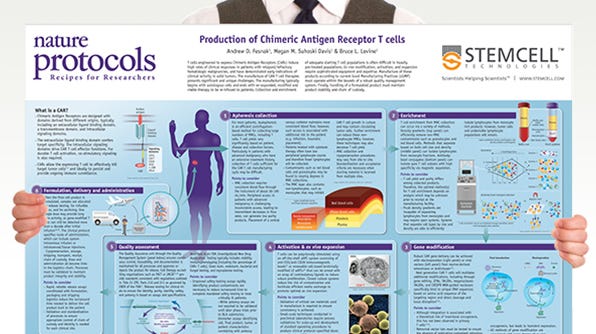Immuno-Oncology
Immune cells have the capability to eliminate tumor cells; however, tumor cells can develop the ability to evade immune responses. Current research efforts have been focused on developing personalized strategies for cancer treatment and developing new therapies that bolster the immune response in the fight against tumor cells.
Below is a collection of scientific resources for your immuno-oncology research.
Production of Chimeric Antigen Receptor T Cells
This free Nature Protocols Wallchart summarizes the processes involved in producing CAR T cells for therapy.
Get Your Free Copy >-
 Working with Small Sample Volumes or Low Start Cell Numbers Using the Purple EasySepÔäó and EasyPlateÔäó EasySepÔäó PlatformsTechnical tip from our dedicated team of Product and Scientific Support specialists
Working with Small Sample Volumes or Low Start Cell Numbers Using the Purple EasySepÔäó and EasyPlateÔäó EasySepÔäó PlatformsTechnical tip from our dedicated team of Product and Scientific Support specialists -
 Isolating Cells from Atypical SamplesTechnical tip from our dedicated team of Product and Scientific Support specialists
Isolating Cells from Atypical SamplesTechnical tip from our dedicated team of Product and Scientific Support specialists -
 Isolate Virtually Any Cell Type Using EasySepÔäó or EasySepÔäó Release Indirect Selection KitsUse any biotinylated, FITC-, PE- or APC-conjugated antibody to label your desired cells and mix with EasySepÔäó reagents to obtain highly purified cells
Isolate Virtually Any Cell Type Using EasySepÔäó or EasySepÔäó Release Indirect Selection KitsUse any biotinylated, FITC-, PE- or APC-conjugated antibody to label your desired cells and mix with EasySepÔäó reagents to obtain highly purified cells -
 Non-Viral CRISPR Knock-In Anti-B7-H3 CAR-T Cells Are Amenable for Treatment of Subtypes of Small Cell Lung CancerIn this webinar, Scientist Vimal Keerthi discusses his work on identifying CD276 (B7-H3) overexpression in primary human SCLC and developing a non-viral CRISPR-Cas9 knock-in (CKI) based platform against B7-H3 to manufacture CAR T cells for the treatment of SCLC. He demonstrates the feasibility of this CAR T manufacturing platform and how this provides a blueprint for immediate clinical translation, overcoming the bottleneck of viral vector production.<br><br>This webinar is part of the ÔÇťTranslational T Cell Talks: Scaling for the FutureÔÇŁ event hosted in collaboration with Scientist.com on June 11, 2024. <a href="/translational-t-cell-talks-2024">View the rest of the talks and read the Q&A transcripts.</a>
Non-Viral CRISPR Knock-In Anti-B7-H3 CAR-T Cells Are Amenable for Treatment of Subtypes of Small Cell Lung CancerIn this webinar, Scientist Vimal Keerthi discusses his work on identifying CD276 (B7-H3) overexpression in primary human SCLC and developing a non-viral CRISPR-Cas9 knock-in (CKI) based platform against B7-H3 to manufacture CAR T cells for the treatment of SCLC. He demonstrates the feasibility of this CAR T manufacturing platform and how this provides a blueprint for immediate clinical translation, overcoming the bottleneck of viral vector production.<br><br>This webinar is part of the ÔÇťTranslational T Cell Talks: Scaling for the FutureÔÇŁ event hosted in collaboration with Scientist.com on June 11, 2024. <a href="/translational-t-cell-talks-2024">View the rest of the talks and read the Q&A transcripts.</a> -
 Improving Cell Recovery with EasySepÔäó Negative Selection KitsTechnical tip from our dedicated team of Product and Scientific Support specialists
Improving Cell Recovery with EasySepÔäó Negative Selection KitsTechnical tip from our dedicated team of Product and Scientific Support specialists -
 Reducing Platelet Contamination in Blood SamplesPlatelets (thrombocytes), cell fragments derived from megakaryocytes, are used in normal blood clotting, and must be handled gently to prevent activation
Reducing Platelet Contamination in Blood SamplesPlatelets (thrombocytes), cell fragments derived from megakaryocytes, are used in normal blood clotting, and must be handled gently to prevent activation -
 Preparing a Polymorphonuclear Cell Fraction from Whole Blood using Ammonium Chloride LysisTechnical tip from our dedicated team of Product and Scientific Support specialists
Preparing a Polymorphonuclear Cell Fraction from Whole Blood using Ammonium Chloride LysisTechnical tip from our dedicated team of Product and Scientific Support specialists -
 Assessment of Your Starting Sample and Calculation of Recovery from Cell Isolation ProceduresSetting aside a small portion of your starting sample allows you to assess the frequency of desired cells in the sample prior to isolation
Assessment of Your Starting Sample and Calculation of Recovery from Cell Isolation ProceduresSetting aside a small portion of your starting sample allows you to assess the frequency of desired cells in the sample prior to isolation -
 Importance of Using an FcR Blocker During Cell Separation ProceduresEasySepÔäó Other Species indirect selection kits can be used to isolate cells from any species
Importance of Using an FcR Blocker During Cell Separation ProceduresEasySepÔäó Other Species indirect selection kits can be used to isolate cells from any species -
 How to Characterize Extracellular Vesicles by Western BlottingHow to characterize extracellular vesicles and analyze for presence of characteristic EV protein markers by western blotting
How to Characterize Extracellular Vesicles by Western BlottingHow to characterize extracellular vesicles and analyze for presence of characteristic EV protein markers by western blotting



